This post may contain ads and affiliate links and we may earn a small commission when you click on the links at no additional cost to you. As an Amazon Affiliate, we earn from qualifying purchases. You can read our full disclaimer here.
Golden Retriever and Kids: A Guide to Safe and Happy Interactions
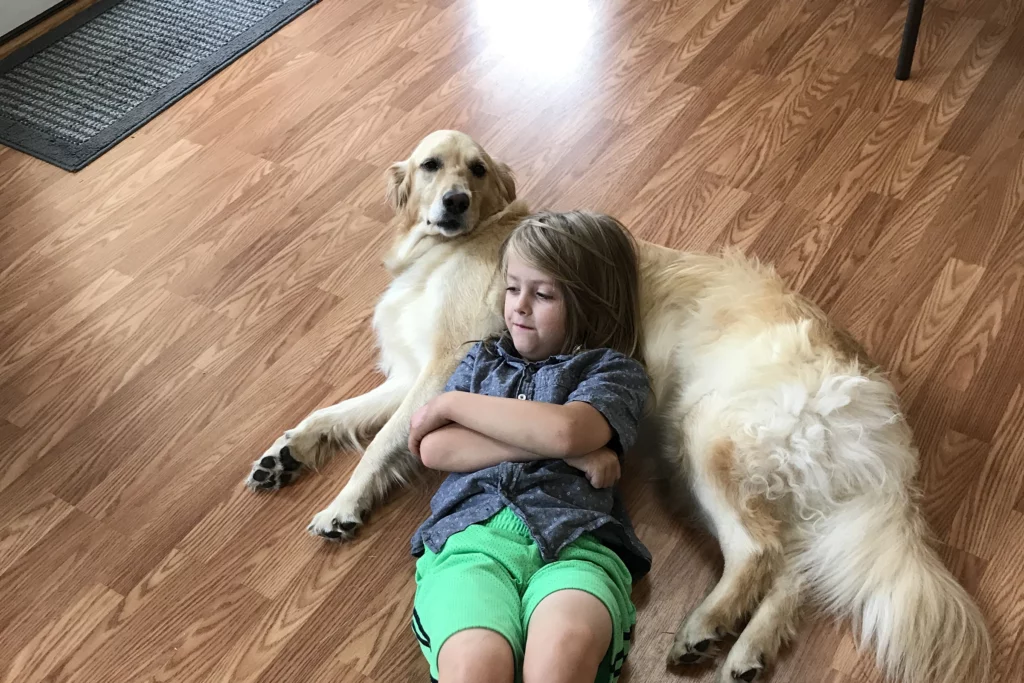
A Golden Retriever and kids form a delightful combination, ideally suited for family environments.
Known for their sweet-natured and playful personality, a Golden Retriever is an excellent companion for kids, offering a gentle approach with young children and a robust enthusiasm for games with older ones.
Their ability to adapt to the energy levels of kids makes them versatile pets, capable of being calm with toddlers and lively with active older kids.
As a popular dog breed in the United States, Golden Retrievers can provide numerous benefits for the entire family.
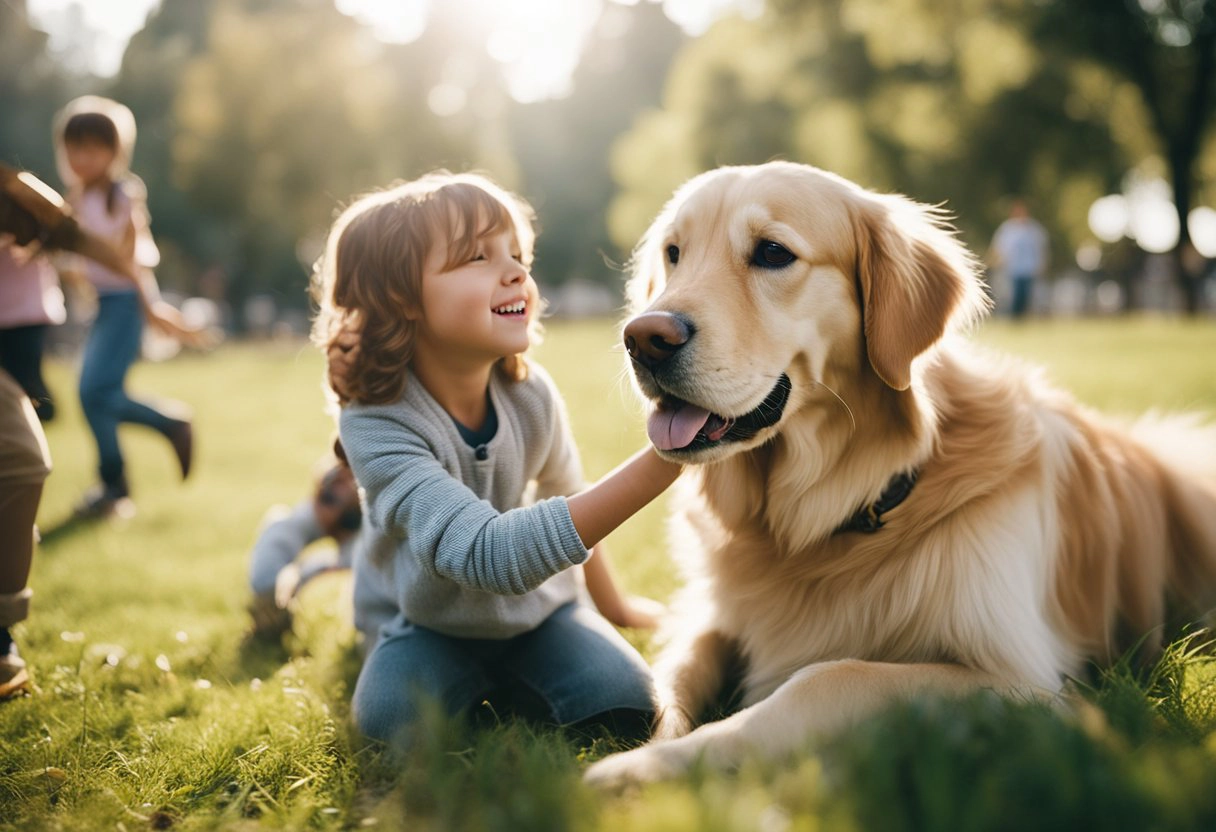
When it comes to choosing a pet for your family, considering the temperament and size of a dog breed is essential.
Golden Retrievers are medium-sized sporting dogs, typically weighing between 55 to 75 pounds and standing between 21 to 24 inches tall. Their broad heads, short ears, deep chests, and muscular builds give them a friendly and warm demeanor, which translates to them being calm, loving, and eager to please.
Besides being good with children, Golden Retrievers can also be beneficial for kids in terms of learning responsibility and developing empathy. Their intelligence and gentle nature make them easy to train, allowing children to take an active role in their care.
With the right guidance and interaction, Golden Retrievers can be an integral part of a loving and happy family environment.
Golden Retrievers and Kids
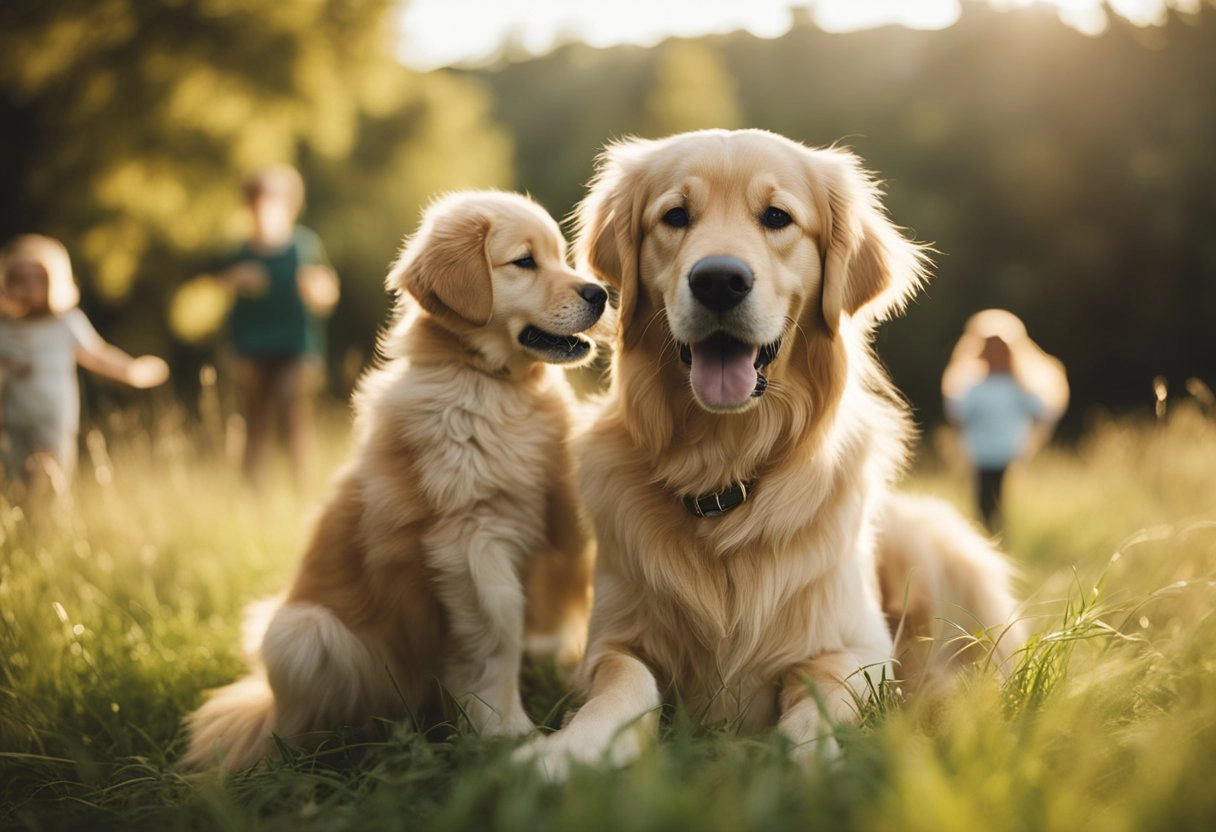
A Look at a Golden Retriever and Kids Under Five Years Old
Golden Retrievers, as one of the most popular dog breeds in the United States, are well known for their gentle nature and affectionate demeanor. They are excellent family dogs and naturally good with kids.
When you have children under five years old at home, you can trust a Golden Retriever to be loyal and patient with them.
As a parent, it’s essential to teach your young children how to interact with a Golden Retriever properly. Make sure they understand not to pull on the dog’s fur or tail, as it could cause discomfort or irritation.
Encourage them to play gently with the dog, avoiding roughhousing or teasing. Being energetic dogs, Golden Retrievers enjoy playtime, but it’s crucial to ensure that their energy is channeled positively and safely.
Golden Retriever and Babies
Golden Retrievers are also known to behave considerately around babies. Their protective instincts can make them cautious and attentive near an infant.
Nevertheless, it’s crucial to always supervise any interaction between your Golden Retriever and your baby to ensure their safety.
Some tips for introducing your Golden Retriever to your baby:
- Allow the dog to sniff the baby’s clothing or blanket beforehand, so they become familiar with the new scent.
- Maintain a controlled environment during the first meeting, with the dog on a leash.
- Give your Golden Retriever praise and positive reinforcement when they behave calmly and gently around the baby.
Remember, every dog has its personality and temperament. While Golden Retrievers are generally great with kids and babies, it’s essential to observe your individual dog’s behavior closely and address any issues as soon as possible.
By doing so, you can ensure a harmonious and loving relationship between your Golden Retriever and your children.
Developmental Benefits for Children
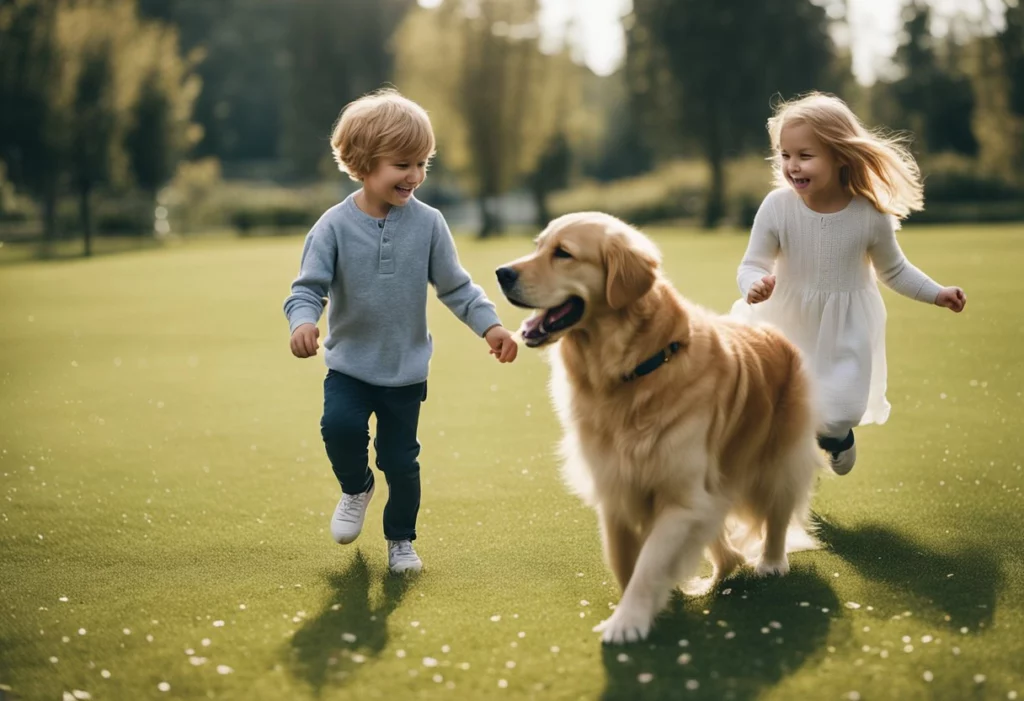
As a parent, you will find that Golden Retrievers can have many positive effects on your children’s development. Their friendly, affectionate nature and playfulness encourage kids to engage in physical activities that promote a healthy and active lifestyle.
Moreover, their high intelligence level and need for mental stimulation can help children learn problem-solving skills through play.
Having a Golden Retriever in your family can teach your children valuable life lessons, such as responsibility and empathy. They will learn to care for their canine companion, ensuring it receives proper nutrition, exercise, and grooming.
This, in turn, fosters a sense of responsibility that will serve them well in life.
Additionally, Golden Retrievers are known for their patience and ability to adapt to the energy levels of different family members. This makes them excellent companions for children with special needs or those experiencing emotional challenges.
The gentle and calming presence of a Golden Retriever can provide emotional support, helping to alleviate stress and anxiety.
Social skills development is another advantage of having a Golden Retriever around kids. These dogs are known for their sociable and friendly demeanor, which encourages children to interact with them and other people, cultivating social confidence and emotional intelligence.
In summary, the presence of a Golden Retriever in your family can contribute to your children’s physical, emotional, and social development, making them a nurturing and valuable addition to any household.
Safety and Boundaries for a Golden Retriever and Kids
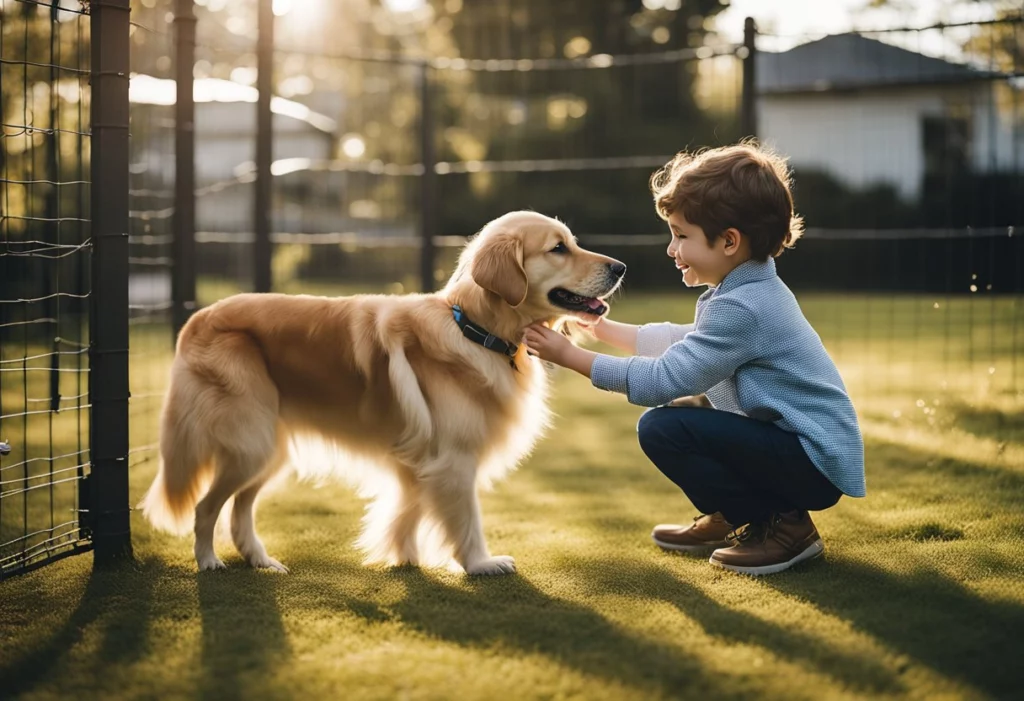
Golden Retrievers are known for their gentle nature, making them a popular choice for families with children. To ensure harmony and safety between your Golden Retriever and kids, you need to establish some guidelines and boundaries.
Firstly, teach your children how to approach and handle the dog properly. Explain the importance of gentle petting and not pulling on the dog’s fur, ears, or tail.
Golden Retrievers are usually patient, but it’s essential to respect their limits to prevent any unwanted reactions.
Encourage your children to give the dog personal space, especially during meals and resting time. It’s essential to create a designated area for your Golden Retriever where they can rest without disturbances.
Additionally, make sure your kids understand that they should never disturb a dog when it is eating or sleeping.
When playing with your Golden Retriever, ensure that the games are suitable and safe for both the dog and the children.
Fun Games for a Golden Retriever and Kids
- Fetch: This classic game allows your children to interact with the Golden Retriever while burning off excess energy.
- Hide and Seek: Teach your kids how to hide a toy or treat for the dog to find. This activity builds a connection between the children and the dog while helping the dog practice its searching skills.
- Gentle Tug-of-War: Using a soft toy, children can engage in a game of tug with their Golden Retriever. Make sure the kids understand the importance of giving up the toy if the dog shows signs of aggression or discomfort.
Consistent training and positive reinforcement are key for a harmonious relationship between your Golden Retriever and children. Set up a routine for activities such as feeding, walking, and grooming, to help your dog develop habits that align with your family’s lifestyle.
Lastly, always supervise interactions between your children and the dog, particularly with younger kids. By doing so, you can quickly intervene if necessary, ensuring the safety of both your child and your Golden Retriever.
With these steps in place, your family and your dog can forge a loving bond and enjoy countless hours of fun together.
Personality and Temperament
Golden Retrievers are known for their intelligent and gentle nature, making them a great choice for families with children. These dogs are highly trainable, thanks to their innate intelligence, which enables you to teach them various commands and tricks.
Their gentle disposition also ensures that they are careful around little ones, making them an ideal playmate.
Being an active and friendly breed, Golden Retrievers require regular exercise to stay healthy and happy. They thoroughly enjoy playtime with kids, and their affectionate nature ensures strong bonds with their human family members.
Keeping your Golden Retriever engaged and entertained with outdoor activities and games will not only benefit them physically but also positively impact their mental health.
Their friendly demeanor extends beyond their human family, as Golden Retrievers are known to be tolerant and peaceful with other pets and animals. This accommodating trait makes them an excellent choice for families with multiple pets or those who may introduce new pets in the future.
In summary, Golden Retrievers are known for being:
- Intelligent: Highly trainable and able to learn various commands and tricks.
- Gentle: Careful around young children and less likely to cause unintentional harm.
- Active: Require regular exercise to stay physically and mentally healthy.
- Friendly: Warm, sociable nature that forms strong bonds with human family members.
- Affectionate: Loving and devoted dogs that thrive on attention and companionship.
- Tolerant of Children: Patient and understanding with the energetic nature of children, making them ideal playmates.
Check out our post about taming a needy Golden Retriever.
By understanding these characteristics, you can ensure that a Golden Retriever would be an excellent addition to your family dynamic.
Their love and dedication to their human family create a lasting and cherished bond that enriches the lives of both the dog and their owners.
Training Your Golden Retriever to be Kid Friendly
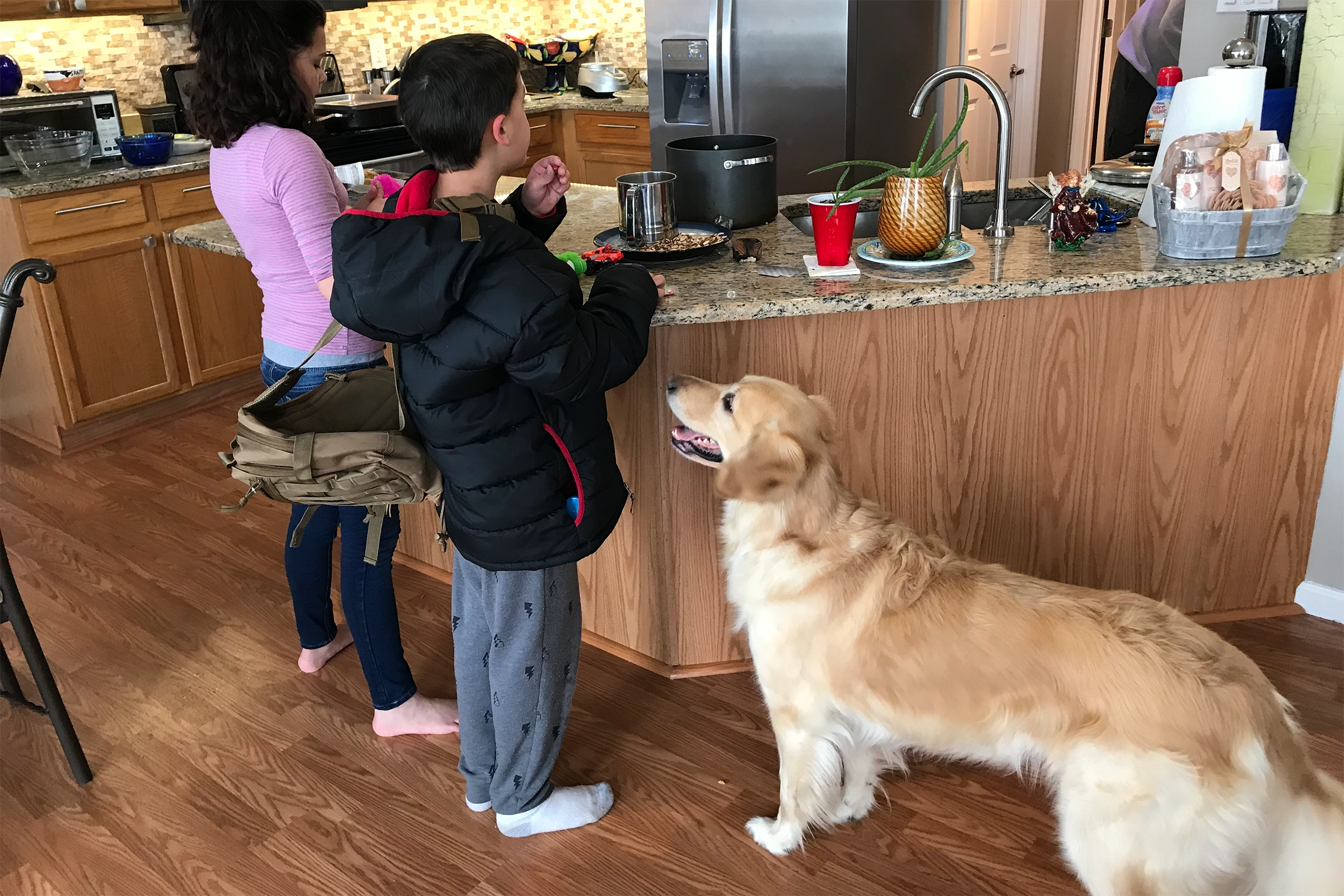
Golden Retrievers are naturally inclined to please, which facilitates their training. To foster a positive dynamic between a Golden Retriever and kids, it’s important to start training early.
Consistent, simple commands and a routine will guide your dog to behave appropriately around children.
Socializing Your Golden Retriever
Socialization is crucial for a well-behaved Golden Retriever. It helps them interact safely and happily with kids. Here are five specific actions to take:
- Frequent Visits to Parks: Bring your Golden Retriever to parks where children play. This allows them to get used to the sounds and movements of kids at play.
- Playdates with Kids: Arrange for your Golden Retriever to have supervised interactions with a variety of kids. This could include quiet time with shy children and more active play with energetic kids.
- Exposure to Family Environments: Have your Golden Retriever spend time in different family settings. This includes indoor and outdoor activities, so they can understand how to behave in various home environments.
- Meet and Greets with Other Pets: Introduce your Golden Retriever to other family pets, teaching them to be gentle and respectful. This is essential, especially if you visit homes with other animals.
- Positive Experiences with Strangers: Make sure your Golden Retriever meets all sorts of people, from delivery personnel to neighbors, which helps them not to feel anxious around strangers.
The Importance of Classes
Enroll your Golden Retriever in puppy classes or obedience training. These classes are more than just learning commands; they’re about building confidence and social skills in a structured environment.
Consistency is Crucial
Maintain a consistent approach to training. Use positive reinforcement techniques, like treats and praise, to reward your Golden Retriever for good behavior, especially in their interactions with kids.
Exposure to Different Situations
Get your Golden Retriever used to various experiences:
- Vet Visits: Regularly scheduled vet appointments will get your dog comfortable with being handled by professionals.
- Car Rides: Frequent car trips can help your dog become a calm traveler.
- New Environments: Visiting new locations can acclimate your Golden Retriever to different stimuli and settings.
Creating a Family Companion
By investing in detailed training and socialization, you’re setting the stage for a Golden Retriever that’s not only a pet but a cherished member of the family, friendly and gentle with kids of all ages.
The effort put into this important phase pays off in countless ways, from ensuring safety to nurturing a deep bond between your Golden Retriever and the children they’ll grow alongside.
Exercise and Mental Stimulation for a Golden Retriever and Kids
As a Golden Retriever owner, it’s essential to provide your furry friend with the right amount of exercise and mental stimulation. These high-energy dogs require daily physical activities to maintain their health and happiness. At least two hours of exercise per day is ideal for young adult Golden Retrievers.
Outdoor activities such as fetch, jogging, or swimming are excellent options to keep your Golden Retriever both physically and mentally engaged. They not only burn off excess energy but also help them focus better in their daily lives.
In addition, incorporating games or challenges that provide mental stimulation is crucial for your Golden Retriever’s overall well-being.
Puzzle toys, scent tracking, or obedience training can help sharpen their cognitive skills and problem-solving abilities.
Remember that a tired dog is a happy dog, so be sure to balance both physical exercise and mental stimulation for your Golden Retriever. This way, they can grow into well-rounded and well-behaved members of your family, especially around children.
Final Thoughts on a Golden Retriever and Kids
Golden Retrievers are known for their loving and intelligent nature, making them a popular choice for many families. They are highly active, which means your kids will have a great companion to play and spend time with, keeping them both entertained and healthy.
Remember that Golden Retrievers have a soft mouth, which is an advantage when interacting with children. They are gentle and careful when playing, which helps prevent accidents and injuries.
However, it’s still essential to teach your kids how to interact with dogs properly, as well as respecting their space and needs.
Having a Golden Retriever in your family will not only provide fun and activity for your children, but they can also play a protective role. While they are not considered an aggressive breed, their loyalty and love for their human family can make them vigilant and watchful over the children.
It’s important to keep in mind that owning a Golden Retriever requires dedication and resources. They need regular physical and mental stimulation to stay healthy and happy. This includes daily walks, playtime, and proper training.
Make sure you and your family are prepared to invest the time and energy needed to give your dog the best life possible.
A Golden Retriever can be a fantastic addition to a family with children. Their loving, intelligent, and active nature makes them a great companion for kids, fostering strong bonds and happy memories.
Just ensure that you’re ready for the commitment and have educated your children on proper interaction and respect for their furry friend.
-

Coffee Mug – In Dog Coffees I’ve Only Had One
$11.95 – $14.95 Select options This product has multiple variants. The options may be chosen on the product page
